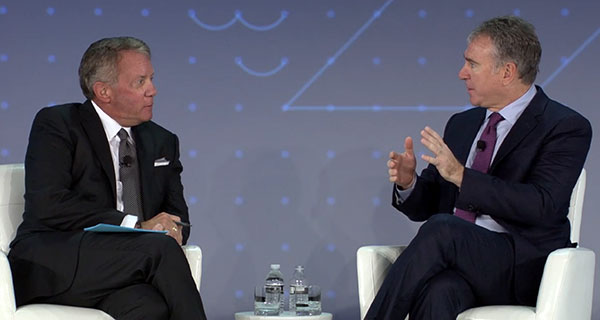Ken Griffin, the founder and CEO of Citadel, participated in a wide-ranging discussion as part of his keynote appearance at CME Group’s annual Global Financial Leadership Conference earlier this week in Naples, Fla. Griffin began trading from his Harvard dorm when he was just 19 years old and has since gone on to start and run one of the most successful investment firms in the world. Here are the key takeaways from his session at GFLC:
- Griffin believes President Trump’s verbal attacks on the Federal Reserve could cause serious reputational damage to the dollar.
- On the current status of liquidity in the markets: “Liquidity is great for end users, not so much for banks. Banks complain about liquidity because they want regulators to come in and re architect a moat to protect their business models.”
- The swift policy steps US regulators put in place in response to the Great Financial Crisis propelled US banks to positions of global dominance while banks from other jursidictions are still working to untanlge themselves from slower regulatory responses.
- The US is well-positioned to lead global markets because othre countries are facing unique headwinds. For example, Canada and Australia are facing challenges related to commodities, while Germany could be hindered by possible spillover from the economic situation in Italy.
- Griffin expressed particular dismay at the current situation in Venezuela: “Without rule of law, you have no chance for growth. You can’t attract businesses if there is no belief that law will be upheld. … Venezuela is one of the wealthiest countries in the world when it comes to natural resources and its people are dying of starvation. It is insanity.”
- Many financial services executives are concerned that the industry is attracting as many MBAs as it once did, but Griffin isn’t. Griffin explained that increased productivity in finance means the industry needs fewer and fewer people. “Let those MBAs go run companies like the next Apple and Uber,” Griffin added.
- Griffin thinks it will always be difficult for the financial services industry to enjoy a stellar reputation because human beings inherently don’t like owing money. Interest payments mean everyone is bitter toward their bank. Griffin added that it is also an unfortunate fact that foreclosure externalities weren’t a consideration for the people who created securitized products that helped crash the economy a decade ago.
